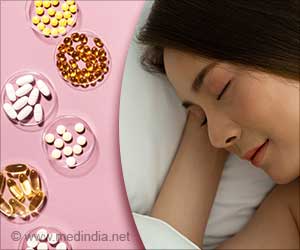
A diet alone does not provide all the vitamins that are needed. In that case, supplements can play an important role in filling those gaps.
Here are vitamins that are linked to poor sleep.
Vitamin B6 – Increases the production of hormones serotonin and melatonin, both of which are important to sound, restful sleep, and mood. Therefore, to fall asleep peacefully and lower the risk of depression, include bananas, peanuts, oats, pork, chicken, fish, and turkey.
Vitamin D– Scientific evidence indicates that vitamin D influences the amount and quality of sleep we obtain by inducing sleep-regulating cells. Lower vitamin D levels were associated with the severity of sleep apnea. Include vitamin D-rich foods like mushrooms, salmon, sardines, egg yolk, dairy, and expose to sunlight to help with irregular sleep patterns.
Vitamin E – A powerful antioxidant that protects cells from damage, may also help sleep and sleep-related health problems. Sleep deprivation often leads to memory loss and cognitive decline in the long run. It also protects testosterone production from the effects of sleep deprivation. Include almonds, sunflower oil and seeds, pumpkin, spinach, and red bell peppers that offer protection against health issues from lack of sleep.
Vitamin B12– Regulates sleep-wake cycles by keeping circadian rhythms in sync. Higher vitamin B12 levels are linked to a lower risk of depression. Include more dairy, eggs, meat, fish, and shellfish in the diet for people with sleep-wake disruptions and for people with symptoms of depression.
READ RELATED: Why Our Body Odor Changes? The Science of Odor as We Age
Vitamin C – The health-promoting abilities of vitamin C may improve sleep quality and decrease daytime sleepiness. It also reduces the health risk associated with sleep apnea by relieving some of the stress that this sleep disorder puts on the cardiovascular system. Get a share of this essential vitamin by including orange, berries, peppers, kale, spinach, broccoli, lemon, and Brussels sprouts in your diet.
Sticking closer to a diverse diet containing whole and unprocessed foods rich in these vitamins, don’t forget to get out in the sun for a vitamin D fix. These are the simplest and important sleep habits we should adopt for a healthy lifestyle.
Reference:
- The role of Vitamin D in treatment of Chronic Insomnia with Melatonin (P5.320) – (https://n.neurology.org/content/90/15_Supplement/P5.320)
Source: Medindia
Source:






